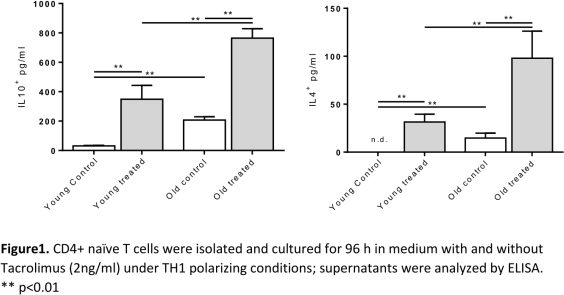Aging Enhances Immunosuppressives Capacities of Tacrolimus By Functional Changes of CD4+ T-Cells
1Transplant Surgery Research Laboratory and Division of Transplant Surgery, Brigham and Women's Hospital, Harvard Medical School, Boston, MA
2Transplantation Research Center, Renal Division, Brigham and Women's Hospital, Harvard Medical School, Boston, MA.
Meeting: 2015 American Transplant Congress
Abstract number: A249
Keywords: Age factors, Immunosuppression, Rejection, T cells
Session Information
Session Name: Poster Session A: Preclinical Immunosuppression and Tolerance
Session Type: Poster Session
Date: Saturday, May 2, 2015
Session Time: 5:30pm-7:30pm
 Presentation Time: 5:30pm-7:30pm
Presentation Time: 5:30pm-7:30pm
Location: Exhibit Hall E
Immunosenescence has broad consequences on alloimmunity and immunosuppression in the elderly may require age-adaptation. Here, we investigated the influence of aging on the effectivity of Tacrolimus by performing a fully MHC-mismatch skin transplants (DBA) in young (6 wks.; C57BL/6) and old recipient mice (18 month; C57BL/6). Transplant outcomes were monitored and mechanisms of immune responses were dissected in detail.
Tacrolimus dosed in a weight-adjusted fashion, resulted into a highly significantly prolonged survival in old recipients (26.3 vs. 11.3 d; n = 7; p=0.001). Of note, trough levels were significantly higher in older animals. Next, we adjusted Tacrolimus dose by trough levels; mean graft survival remained to be prolonged in old recipients (15.4 vs. 11 d. in young recipients; n=7) n = 7; p=0.003). Detailed immune monitoring revealed declining CD4+ T cells in old recipients (2.9 x 106 vs. 5.4 x 106, p<0.001). Proliferation of CD4+ T cells was inhibited in an age-specific manner (x1.7 in old mice; p<0.05). Similarly, cytokine production was affected in an age specific fashion with reduced productions for IL-2+, IL-17A+ and IL-4+ in old mice (p<0.05). When naïve CD4+ T-cells were cultured under TH1 polarizing conditions, as present subsequent to transplantation, old naïve CD4+ T cells produced more IL10+ and IL4+ (p< 0.01). Strikingly, this effect was significantly enhanced, when Tacrolimus was added to the cell culture.
In summary, older mice demonstrated a significantly prolonged graft survival under adjusted trough levels for Tacrolimus. Moreover, CD4+ T-cell function is more suppressed in old recipient mice. Of note, old naïve CD+ T cells produced more IL-10+ and IL4+ under Th1 polarizing conditions. Those data indicate an age-specific effectivity of Tacrolimus supporting that older organ recipients may require reduced Tacrolimus doses. 
To cite this abstract in AMA style:
Krenzien F, Quante M, ElKhal A, Uehara H, Abdi R, Slegtenhorst B, Biefer H, Tullius S. Aging Enhances Immunosuppressives Capacities of Tacrolimus By Functional Changes of CD4+ T-Cells [abstract]. Am J Transplant. 2015; 15 (suppl 3). https://atcmeetingabstracts.com/abstract/aging-enhances-immunosuppressives-capacities-of-tacrolimus-by-functional-changes-of-cd4-t-cells/. Accessed July 18, 2025.« Back to 2015 American Transplant Congress
